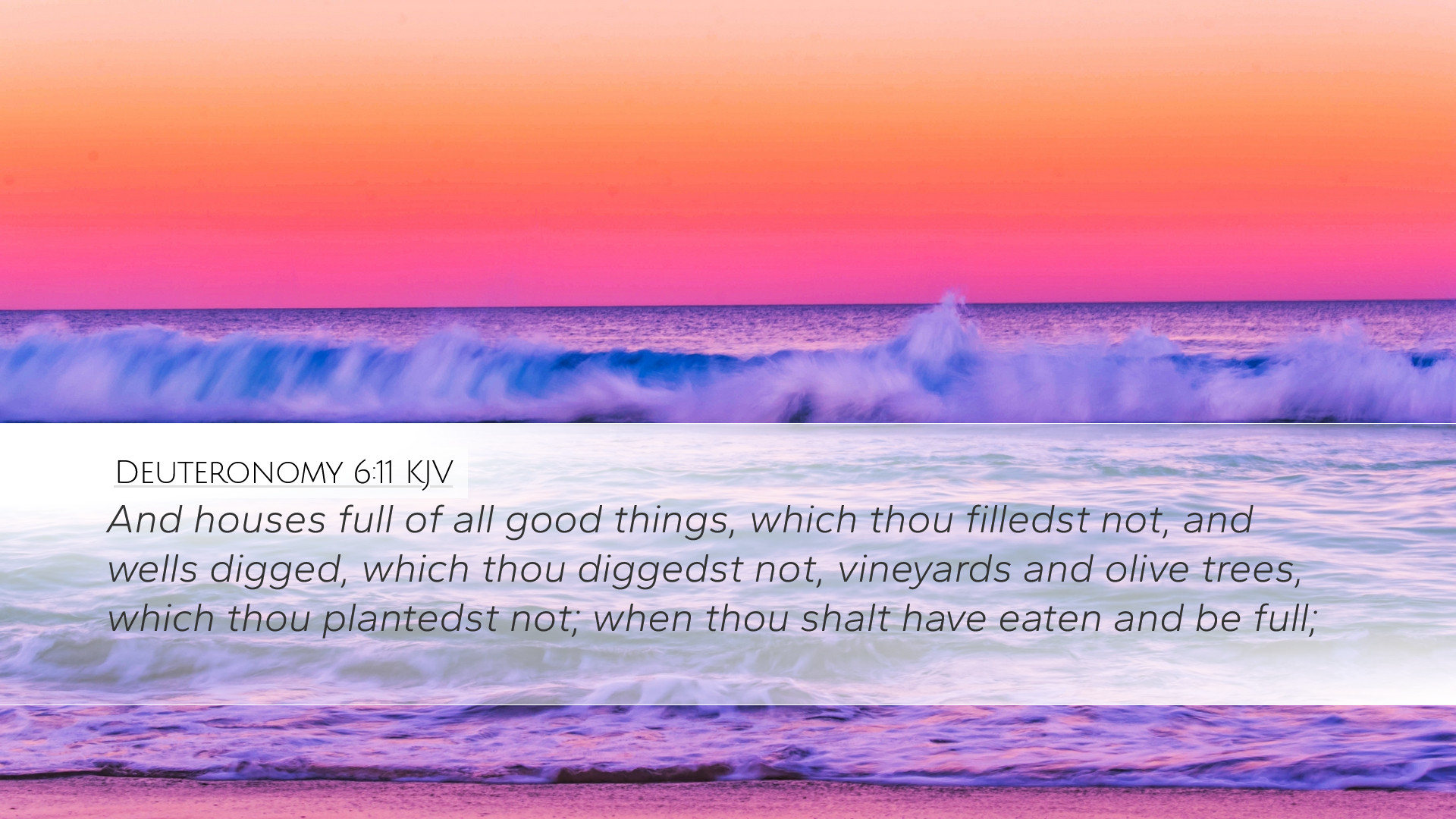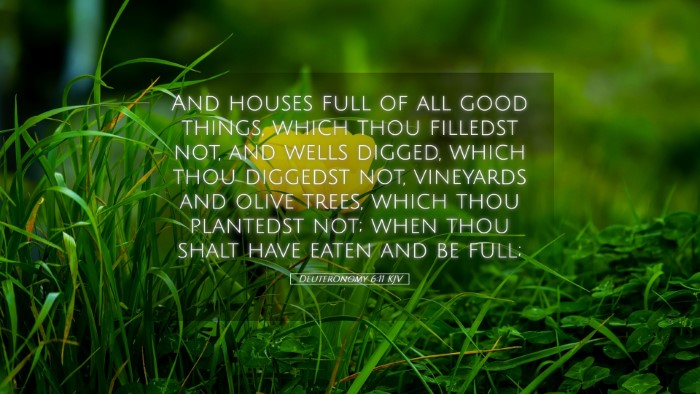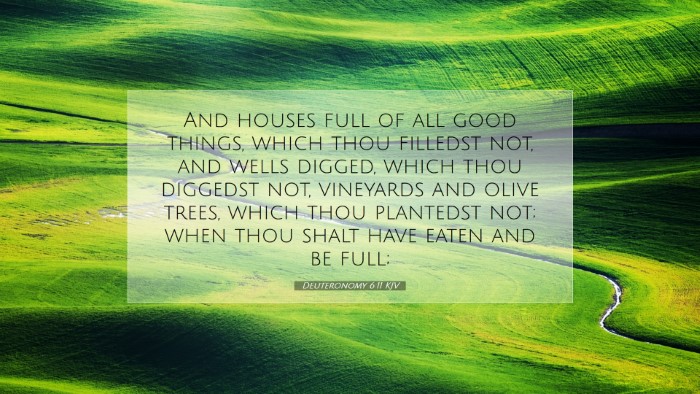Bible Commentary on Deuteronomy 6:11
Verse: Deuteronomy 6:11 - "And houses full of all good things, which thou filledst not, and wells digged, which thou diggedst not, vineyards and olive trees, which thou plantedst not; when thou shalt have eaten and be full."
Introduction
The passage from Deuteronomy 6:11 speaks to a moment in the lives of the Israelites that has profound implications for understanding God's provision and the responsibilities of His people. This commentary draws on insights from public domain sources, including Matthew Henry, Albert Barnes, and Adam Clarke, to provide theological reflections on this verse.
Contextual Background
The context of this verse lies within the theological and practical exhortations that Moses imparts to the Israelites as they prepare to enter the Promised Land. Deuteronomy serves as a Covenant renewal document, reminding the Israelites of God's law, His faithfulness, and the blessings tied to obedience.
Historical Significance
The mention of “houses full of good things” signifies the Lord's abundance and grace. The Israelites are reminded that they are about to inherit what they did not labor for, emphasizing that their entrance into the land was an act of divine favor.
Commentary Insights
This verse offers various theological insights, notably around themes of grace, responsibility, and worship.
Matthew Henry's Insights
Henry emphasizes the graciousness of God in bestowing blessings on His people. He writes that these blessings should lead to gratitude and a sense of responsibility. Henry cautions that having abundance can sway one towards forgetfulness of God. Therefore, the admonition to remain focused on God amid prosperity is vital.
- Divine Favor: Henry notes that the blessings mentioned are a testament to God’s unmerited favor.
- Warning Against Complacency: He underscores the danger of becoming complacent or forgetful once in possession of these blessings.
Albert Barnes' Reflections
Barnes highlights the significance of acknowledging God's role as the ultimate provider. He views the verse as a reminder to not only recognize the physical blessings received but also the spiritual implications tied to them. He expounds on the necessity of keeping the teachings of God central in their routines.
- Recognition of God's Provision: Barnes emphasizes that the verse reflects the necessity of gratitude towards God for all that is found within the Promised Land.
- Covenantal Responsibilities: He argues that the Israelites have a duty to respond to God’s gifts with obedience and dedication.
Adam Clarke's Analysis
Clarke provides a detailed examination of the physical and spiritual dimensions of the blessings mentioned in the verse. He connects the Jewish anticipation of the Promised Land with a deeper understanding of spiritual wilderness and a collective identity rooted in God's promises.
- Symbolism of Inheritance: Clarke infers that the ‘houses’ represent not just physical structures but a place of identity and belonging grounded in the covenant with God.
- Spiritual Vigilance: He warns against the pitfalls of abundance leading to spiritual dullness, stressing the need for ongoing vigilance in faith.
Theological Implications
The verse can be understood on multiple levels, both practically and spiritually. The physical blessings serve as a metaphor for God's grace, while the responsibilities underscore a profound truth about human stewardship.
Grace and Provision
God’s act of providing for His people indicates a deep commitment to His covenant promises. The houses, vineyards, and wells symbolize richness in both physical and spiritual terms. This portrayal invites believers today to see the blessings of life as opportunities to engage and respond to God’s love with gratitude.
Stewardship and Responsibility
Realizing that they have received what they have not earned fosters a humble posture. Faithful stewardship becomes crucial, as believers are called to not only enjoy their blessings but also share them in love and service to others.
Practical Applications
For pastors, students, and theologians, this passage provides a robust framework for preaching and teaching about God’s blessings and the corresponding responsibilities of believers. Various applications arise from the fundamental principles embedded within this verse:
- Gratitude in Worship: Encourage congregations to maintain a posture of gratitude for God’s blessings in prayers, hymns, and everyday reflection.
- Instructing About Stewardship: Addressing how to manage resources wisely can serve to honor God’s provision.
- Fostering Community and Sharing: As believers enjoy their blessings, they should be taught to share with those in need, reflecting God's generosity.
Conclusion
Deuteronomy 6:11 serves as a powerful reminder of God’s abundant grace and the importance of faithful stewardship. As believers reflect on the blessings they have received, they must simultaneously embrace their call to honor God through their actions. This balance between receiving and yielding is crucial for growth in both individual faith and community worship.


